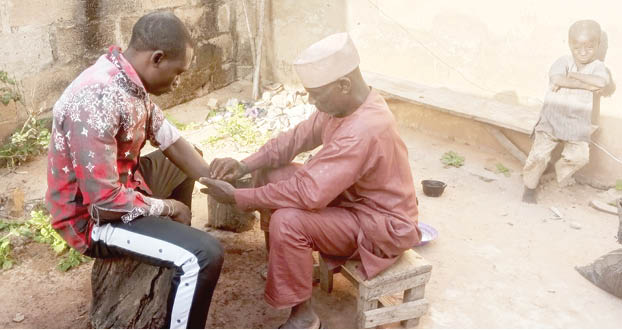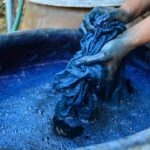In the corners of rural communities and the compartments of ancient healing practices, the art of bone setting has long been passed down through generations. Deeply rooted in age-long traditions and steeped in sacred prohibitions, the practice is not just about mending broken bones but a cultural drapery woven with spiritual beliefs, taboos and rituals.
From the sacred tools wielded by the healer to the unspoken commandments and rules governing their touch, the art of traditional bone setting is believed by some people to be a place where the physical and the spiritual congregate, and where the contour between healing and ritual is usually hazy.
Weekend Trust gathered that in this practice, there are age-long customs and prohibitions that practitioners observe. These customs and taboos are embedded in cultural beliefs, spiritual practices, and the knowledge passed down through generations. Though societal refinement and religious deliverance have eroded some of the practices considered too harsh, a few still exist.
Notwithstanding, some of these norms and taboos vary significantly from culture to culture, as traditional bone setting is believed to be deeply connected to the certain spiritual beliefs of the people.
Emi-Guzan is a small village in Gbako LGA of Niger State with a century old practice of traditional bone setting. The practice has been passed down for generations, according to 70-year-old Alhaji Yabagi Mohammed, the lead bone setter.
Known only to a few elders, this ancient practice involves not just physical manipulation of broken bones, but rituals designed to restore balance to the body and soul.
Testing the potency of the medicine
In traditional bone setting, as in many other forms of traditional medicine, it’s common for practitioners to test the potency and efficacy of the medicines. For traditional bone setting, the ointment is in most cases tested on animals with broken legs or feathers before they are applied on humans. This practice is usually done to weigh the safety, strength, and efficacy of medicinal amalgams, such as herbal liniments, or other contemporary medicines, in a controlled and to some extent precautionary means.
In the event that there are no animals with broken legs, the practitioners deliberately injure a hen for experiment. By testing the medicine on animals with broken legs or feathers, practitioners aim to confirm that the ointment is ready to be used for the purpose it was prepared for without any harmful side effects when applied to humans.
Alhaji Yabagi Mohammed, the lead bone setter in Emi-Guzan confirmed the practice to Weekend Trust but said the practice of testing the efficacy of the ointment on animals had been discarded due to civilisation and social refinement, adding that the practice varies greatly depending on the cultural and historic context of the specific traditions followed.
He said in some cultures, testing the potency of the medicine on animals might be a part of the wider trial-and-error method, whereas in others, the testing might be based more on the knowledge passed down through generations.
This art of traditional bone setting, known in Nupe language as ‘baban’ is being practised in several villages including, Emi-Guzan. During the preparation, Alhaji Mohammed explained that several spiritual commands were given to ointment which makes it work to the expectations of the practitioners.
He said his grandfathers were known to the practice of testing the potency and efficacy of the medicine on hens or any animal, saying that if the ointment healed animals within a specific time given, the medicine is proven to be good to heal humans with broken legs, hands or any part of the body, including internal injuries arising from accidents.
“Before I took over, the potency of the medicine was usually tested on a hen or cock with a broken leg. Most often, one leg is broken and the medicine is applied to test its potency and efficacy. If it heals within some time, it is a sign that it will be used to treat human beings. That was what our grandfathers told us they used to do.
“But with the coming of religion and civilisation, we have discarded that custom because it was too harsh. This doesn’t affect the practice because any change you make that doesn’t go against the commandments of Allah, Allah will always support you. We saw that as being too harsh to animals.
“Notwithstanding, we still collect hens or cocks from patients but traditionally we don’t eat the animals we collect from our patients nor do we kill them. What we usually do is to give them to beggars each time they come around. We give them out in charity to gain favour from Allah. One thing I must reiterate is that any hen collected in the name of bone setting can never be sold.
“I inherited it from my parents. I cannot tell exactly how it started. It was passed from our great grandfathers to our grandfathers, then to our fathers and finally to us.
“I learnt the art of bone setting and other traditional medicine practice since my childhood. I have practised this for the past 30 years or more. I don’t have the western education to be able to accurately calculate the year I have spent so far practicing the art of bone setting and traditional medicine.”
In Makera Area, Minna, one of the practitioners, 52-year-old Suleiman Garba, said, “We don’t test the potency and efficacy of the medicine on animals but we do collect hens or cocks from the patients which we use in preparing the medicine that we use for treatment.”
Outsiders not allowed to learn the practice
The practice of traditional bone setting and medicine practice is a spiritually guarded practice passed down through generations within the families of the practitioners or communities. The practitioners told Weekend Trust that customs prohibit non-family members from learning the ancient practice, saying that it is a sacred knowledge that should remain within the lineage. They said any non-family member who copies the practice, maybe by closeness with them, would hardly succeed in the practice because it is spiritually guarded.
They also said that prohibiting non-family members from learning the practice helps preserve the integrity and legitimacy of the practice, adding that it echoes a deep reverence for inherited traditions and a belief that such healing skills are not just medicinal practices but spiritual birthrights tied to the family’s legacy.
“My children and grandchildren have all learnt the work from me. But people from outside are not allowed to learn the practice. In fact, the culture of our bone setting practice doesn’t go with a stranger; it is very jealous. Even if you teach someone that is not part of our family to practice and all the ingredients used in preparing the medicine, even if they practice, it doesn’t work. And it was the way our great grandfathers established the practice and we cannot change the way it was established. I have equally warned those who will ascend the throne when I die not to allow any of our traditions to change if they want to succeed,” he said.
“So, this sacred practice of traditional bone setting and medicine is exclusively reserved for members of our lineage, and we are preserving knowledge passed down through generations and safeguarding it from external influence. Even if we teach outsiders, by the time they get to their place to practice it, the medicine may not work,” Alhaji Yabagi Mohammed said.
On her part, Hajiya Hussaina Jibrin, a female traditional bone setter in Minna told Weekend Trust that even her husband was not allowed to learn the practice from her, saying that the tradition did not recognise him as a member of her family.
She noted all her children had already mastered the practice and had been certified, noting that “my father had warned against teaching anybody outside my family, and disobeying that would have negative effects on my practice that is why even my husband would not be allowed to learn the practice.”
Also speaking, Suleiman Garba, the practitioner in Makera Area of Minna, said “We don’t allow people from outside to learn the work because even if they learn it, it won’t work because traditionally, he is not part of us. So, it is not whether we cannot agree; it won’t even work.”
Also forbidden by Makera practitioners is consumption of alcohol while undergoing treatment. The consumption of alcohol was said to have an effect on the potency of the medicine.
“You cannot take alcohol while undergoing treatment with us. It will affect the potency of the medicine. So, we don’t accept that but you can eat any type of food you want to eat except alcohol,” Garba explained.
Patients can’t take medication home
Taking the ointment home has dire consequences and patients are usually warned of such consequences. The refusal to adhere to the belief causes frequent domestic accidents except where precautionary measures are taken, according to Ahaji Yabagi Mohammed. He said one of such measures was to tell the ointment that the patient had permission to take it home for use.
“We have a lot of customs that are forbidden in his practice. One of them is that, if you bring a patient, you must obey those customs.
“First, we don’t give our ointment to patients to take home, but where it becomes necessary, you cannot keep the medicine in the living room or the room where you sleep. It has consequences including frequent domestic accidents. You must keep the medicine outside your house.
“When you are finally done using it, you have to dispose of the rest. Keeping it will cause problems. The medicine works in accordance with our spiritual order and whatever we command it by the grace of Allah is what it shall do,” he said.
He said he had treated many accident victims with broken legs, hands and dislocations from several places including Kano, Lagos, Auchi (Edo State), Ilorin (Kwara State), Ibadan (Oyo State), Kaduna, Jos, and so on.
Patients’ testimonies
Mohammed Alfa Kologa, whose wife is undergoing treatment for internal injuries she sustained in a car accident along Kutigi-Mokwa Road, said “We have been coming for treatment for the past three days. Within the three days, she has recovered from the pains. I have not heard of someone coming here for treatment without being healed once you obey the instructions. It costs less than going to a modern hospital and heals faster. I have only spent N6,000 since we started coming and the N6,000 also covers the cost of fuel I put in my motorcycle to come.”
Another patient, Muhammad Abdullahi whose hand was broken due to a motorcycle accident, told Weekend Trust that, “This is my fourth visit since the incident. When I started coming, my hand was swollen but I feel okay now. When it happened, I couldn’t ride a bike but I can now ride the bike myself. It is cheaper going to traditional bone setters than going to hospital.”
Also speaking, Muhammad Muhammad said “I have been on admission for 20 days. I feel okay now compared to when I had accident.”
Speaking with Weekend Trust, Dr Eso Sunday, an orthopaedic surgeon with the IBB Specialist Hospital in Niger State, said inadequate orthopaedic surgeons in the state forces many people with fractures to patronise traditional bone setters.
“The issue is: how many orthopaedic surgeons do we have in the country? How many do we have in Niger State? If someone breaks leg in Kontagora or in Borgu or in Katcha, there is no orthopaedic surgeon there. So, at the end of the day, people must go where they can be treated. That is why traditional bone setters continue to enjoy patronage.
Despite the high risk involved, he noted that the unavailability of experts and superstitious beliefs force patients to continue to patronise unqualified practitioners leading to the continued popularity of traditional bone setters.

 Join Daily Trust WhatsApp Community For Quick Access To News and Happenings Around You.
Join Daily Trust WhatsApp Community For Quick Access To News and Happenings Around You.


